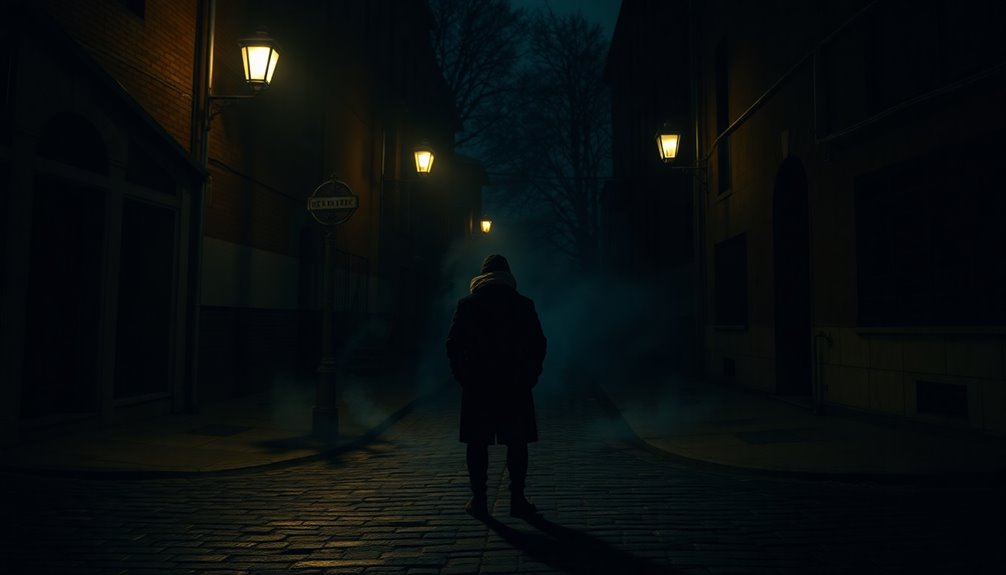In Daphne Du Maurier's chilling tale, "Don't Look Now," you follow a grieving couple, John and Laura, as they navigate their emotional turmoil in the haunting beauty of Venice. The recent death of their daughter casts a dark shadow over their holiday, leading to eerie encounters with mysterious twin sisters. Themes of love, loss, and unresolved grief permeate the narrative, creating a psychologically tense atmosphere. As supernatural elements blur reality, you'll find yourself questioning what lurks beneath the surface. There's much more to uncover about these characters and their journey into the depths of despair and suspense.
Overview of the Story
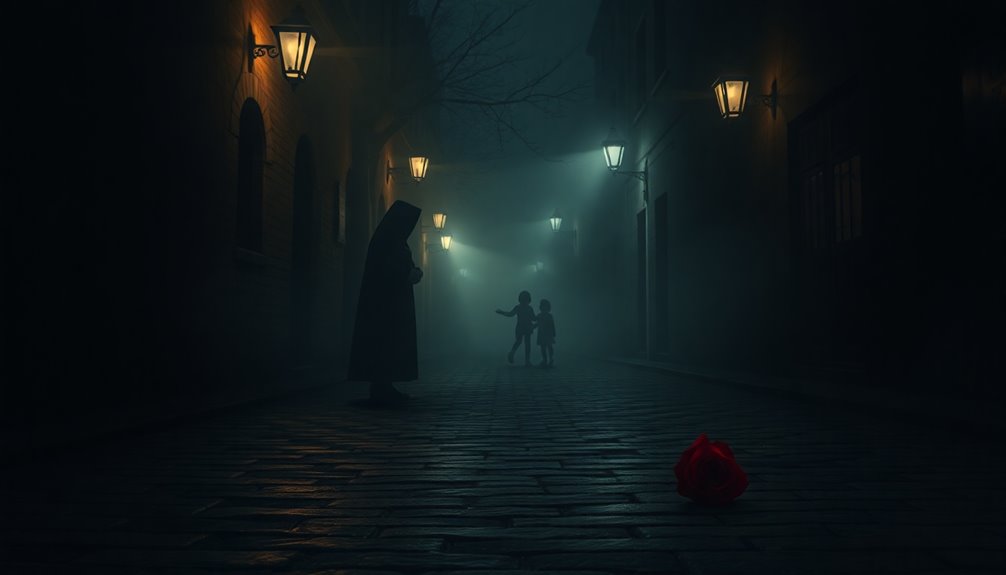
In "Don't Look Now," Daphne du Maurier crafts a chilling narrative centered around a grieving couple on a haunting holiday in Venice. You follow John and Laura, deeply affected by the recent death of their daughter, as they attempt to escape their sorrow. Their journey takes an eerie turn when they encounter two mysterious twin sisters, one of whom claims to be a blind medium. This encounter introduces an unsettling sense of danger, suggesting that the couple's grief might attract darker forces.
As the story unfolds, you're drawn into a web of suspense and psychological complexity. Du Maurier expertly captures the atmosphere of Venice, where the city's beauty contrasts sharply with the couple's internal turmoil. This setting enhances the feeling of isolation and dread, mirroring the themes of love, loss present in her other works. The narrative also reflects the resilience of women in overcoming emotional challenges, resonating with the strength found in historical fiction.
Throughout "Don't Look Now," you feel the palpable tension as ordinary characters find themselves in extraordinary, terrifying situations. The narrative explores themes of love, loss, and the haunting nature of grief, leaving you questioning the boundaries between reality and the supernatural. The story resonates with the idea of resilience amid adversity that is prevalent in literature, highlighting how individuals cope with profound loss.
Fundamentally, "Don't Look Now" is a masterclass in suspense, inviting you to explore the depths of human emotion amidst the chilling unknown.
Key Themes and Motifs
In "Don't Look Now," you'll see how grief and loss shape the characters' lives, driving their actions and decisions. The supernatural encounters serve as a manifestation of their unresolved trauma, blurring the lines between the living and the dead. As you explore these themes, you'll uncover the chilling ways the past haunts the present. The story intricately weaves in the enduring power of family relationships, reflecting how shared grief can lead to profound emotional growth. This exploration mirrors the transformation through trauma recovery that many survivors experience as they confront their past. Additionally, the characters' struggles echo the challenges faced by immigrant communities, illustrating how societal pressures can exacerbate personal losses.
Grief and Loss
Grief hangs like a thick fog in "Don't Look Now," enveloping the protagonists as they navigate the aftermath of their child's death. This profound loss shapes their actions and perceptions, driving a wedge between them.
As they wander through Venice, the haunting presence of their deceased child lingers, a constant reminder of unresolved grief that colors their every experience.
Du Maurier explores deep into the psychological impact of grief, showing how it can warp reality and lead to paranoia. You can feel the couple's increasing disconnection from each other as they grapple with their pain, illustrating how loss can distort relationships.
The motif of memory plays an essential role here; their recollections of happier times intertwine with their present, blurring the lines between what was and what is.
Ultimately, the story reveals how unprocessed grief can release inner demons, pushing you to confront the darkness that emerges when you fail to cope with loss.
In this chilling narrative, the exploration of grief acts as a powerful force, haunting the characters and leaving you questioning the nature of reality itself.
Supernatural Encounters
The haunting atmosphere of Venice amplifies the couple's unresolved grief, setting the stage for supernatural encounters that blur the line between reality and the ethereal. As you navigate the murky canals and labyrinthine streets, the presence of twins, particularly the blind medium, heightens the tension and foreboding. Each encounter feels like a chilling reminder of the couple's lost child, intertwining grief with supernatural elements that challenge your perception of what's real.
Du Maurier masterfully uses Venice's eerie setting to draw you deeper into the couple's psychological turmoil. With every interaction, you witness how their supernatural encounters reveal their inner fears and unresolved pain. The twins, especially the medium, act as unsettling conduits, bringing forth revelations that intertwine love, loss, and the unknown.
The motif of dangerous liaisons becomes evident; the couple's engagement with the supernatural leads them to unsettling truths about their past and each other. You find yourself questioning the nature of these encounters—are they merely figments of their grief, or something more sinister?
In "Don't Look Now," the supernatural isn't just an element of horror; it's a poignant reflection of the couple's emotional landscape.
Author: Daphne Du Maurier
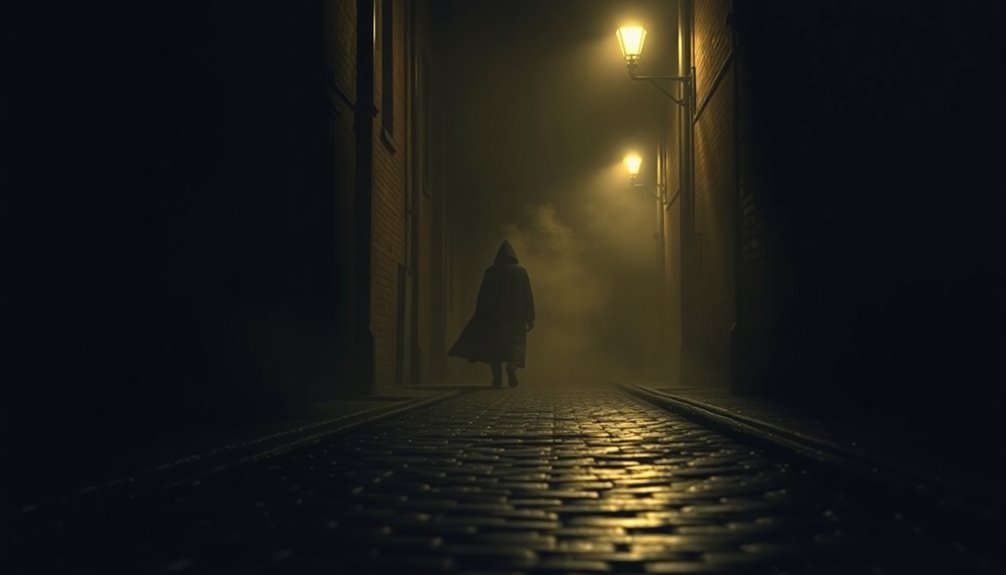
Daphne du Maurier, born on May 13, 1907, in London, emerged from a family steeped in artistic tradition, shaping her unique voice in literature. With a lineage that included actors and authors, it's no wonder she grew to be such a powerful storyteller. Her exploration of female empowerment in her narratives parallels the themes found in works like "Like Water for Chocolate." Du Maurier's ability to create complex characters echoes the vivid character development that defines many classic novels.
You might recognize her for novels like "Rebecca," "My Cousin Rachel," and "Jamaica Inn," where themes of love, jealousy, and psychological depth intertwine seamlessly.
Du Maurier's mastery extends to the short story format, exemplified by "Don't Look Now." In this chilling tale, she showcases her talent for crafting suspenseful narratives within a compact structure.
She frequently explores dark themes—loss, grief, and the supernatural—drawing readers into her haunting worlds. Additionally, she adeptly weaves elements of betrayal into her narratives, enhancing the suspense and complexity of her characters' motivations.
Daphne du Maurier doesn't just capture readers' imaginations; she leaves a lasting impact on literature and film. Many of her works, including "The Birds," have been adapted into iconic movies, further solidifying her status as a key figure in British and Irish literature.
As you investigate her stories, you'll find that her exploration of human emotions and fears resonates deeply, making her work timeless and compelling.
Notable Works by Du Maurier
When you think of Daphne du Maurier, her iconic gothic novels like "Rebecca" and "Jamaica Inn" come to mind, each rich with suspense and atmosphere.
You'll notice how she explores psychological depth in her characters, making you question their motives and feelings. Her settings, often echoing the Gothic atmosphere of Manderley, enhance the sense of unease and intrigue in her narratives. Du Maurier's storytelling also shares similarities with the exploration of power dynamics found in modern literature, demonstrating her influence on various genres.
Plus, many of her works have inspired gripping film adaptations that bring her chilling narratives to life. Additionally, her stories often delve into themes of identity and self-discovery, reflecting the complexities of human experience.
Iconic Gothic Novels
Suspense permeates the pages of Daphne du Maurier's iconic gothic novels, where intricate plots and haunting atmospheres captivate readers. Her original work "Rebecca" stands as a hallmark of the genre, exploring themes of jealousy and identity through the eyes of a young bride overshadowed by her husband's first wife.
You can't help but feel the tension as the narrator grapples with her insecurities and the ghostly presence of the past.
In "My Cousin Rachel," du Maurier crafts a complex tale of love and manipulation, where a young man finds himself ensnared by a mysterious widow. This novel's ambiguity keeps you questioning the truth of Rachel's intentions, drawing you into a web of emotional uncertainty.
Another remarkable piece is "Jamaica Inn," where you'll encounter a young woman amidst smugglers and danger on the eerie Cornish coast. Du Maurier's skill in creating suspenseful settings is evident here, pulling you into a world rife with peril.
Through her iconic gothic novels, you experience not just stories, but an exploration into the human psyche, making du Maurier's work unforgettable.
Psychological Depth Explored
Du Maurier's works go beyond haunting atmospheres and intricate plots; they explore the psychological depths of her characters, revealing the intricacies of human emotion. In novels like "Rebecca," "My Cousin Rachel," and "Jamaica Inn," you'll find her skill in infusing everyday situations with psychological tension and suspense. Each character's journey mirrors the complexity of their inner worlds, making you question the boundaries of love, jealousy, and grief.
In "Don't Look Now," she chillingly depicts the haunting reappearance of a dead child, blending the supernatural with profound psychological depth. This story, along with her short stories, showcases her fascination with the darker aspects of human nature, inviting you to investigate characters who grapple with moral ambiguities and emotional turmoil.
Du Maurier's mastery of the short story format allows her to pack intense psychological engagement into a condensed narrative, creating an atmosphere of dread that lingers long after you've turned the last page.
As you immerse yourself in her works, you'll discover how Du Maurier's psychological depth enriches her storytelling, offering a mesmerizing exploration of the human psyche.
#
Adaptations in Film
Adaptations of Daphne du Maurier's works have captivated audiences on screen, bringing her haunting narratives and psychological depth to life. One of the most notable adaptations in film is "Don't Look Now," directed by Nicolas Roeg in 1973. This film closely follows the eerie narrative of the original short story, while adding layers of cinematic depth that explore themes of grief and loss.
The emotional intensity is heightened by the strong performances from Julie Christie and Donald Sutherland, making the psychological complexity even more palpable.
Another significant adaptation is Alfred Hitchcock's "The Birds," released in 1963. While du Maurier's straightforward tale of avian attacks serves as the foundation, Hitchcock transforms it into a suspenseful thriller, altering the original plot and character dynamics to create a unique cinematic experience.
Both adaptations have garnered critical acclaim; "The Birds" is considered a landmark horror film, while "Don't Look Now" is lauded for its haunting visuals.
Du Maurier's ability to infuse suspense and dread into her stories shines through in these adaptations, showcasing her profound influence on cinematic storytelling.
Writing Style and Techniques
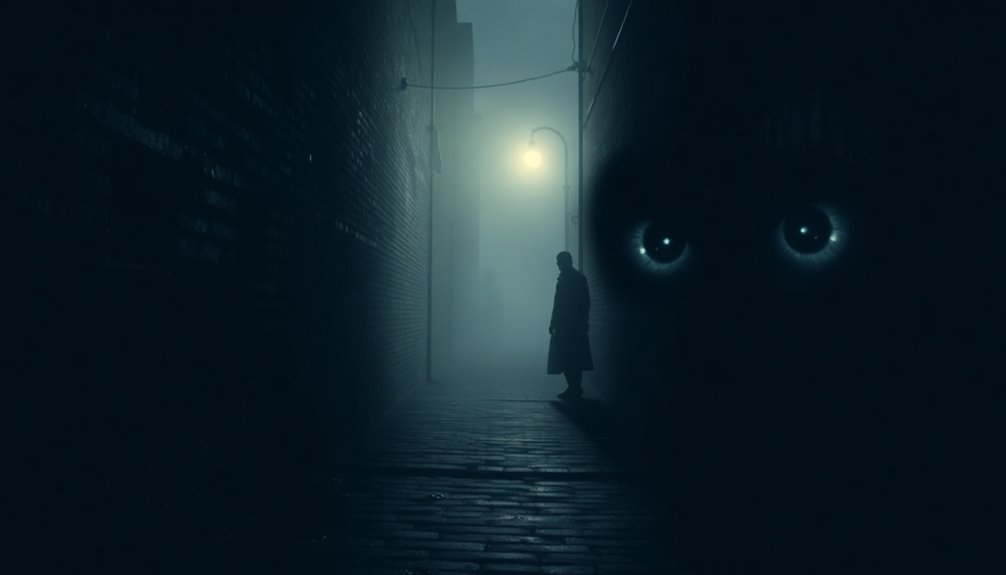
Daphne du Maurier's distinctive writing style captivates readers with its intricate plotting and haunting tone, drawing you into a world where the ordinary becomes unsettling.
In "Don't Look Now," she expertly weaves psychological depth into her narrative, transforming everyday situations into chilling stories that expose the complexities of her characters. Her vivid and evocative descriptions transport you to eerie settings like Venice, enhancing the story's atmosphere and amplifying the suspense. This mirrors Richard Yates' exploration of suburban disillusionment, showcasing how ordinary life can mask deeper emotional turmoil, much like the characters' descent into savagery in *Lord of the Flies* reveals the fragility of societal norms.
- Du Maurier masterfully builds tension, keeping you on the edge of your seat.
- She frequently explores themes of loss and the supernatural, creating a resonant sense of dread.
- Her short story format delivers impactful storytelling, achieving more suspense in just a few pages than many longer novels.
- Much like John Green in "The Fault in Our Stars," du Maurier's work emphasizes the fragility of life, prompting readers to reflect on the significance of treasuring each day.
Character Analysis
In "Don't Look Now," the characters John and Laura Baxter are a poignant representation of love and grief, steering through the treacherous waters of their tragic past. John, a middle-aged schoolmaster, grapples with haunting memories of their deceased daughter. This grief morphs into paranoia, especially during their stay in Venice, where he becomes increasingly distrustful of the eerie surroundings and the creepy old twins they encounter.
Laura, initially appearing as the more emotionally fragile partner, reveals layers of resilience as she copes with her sorrow. While she navigates the supernatural elements in Venice, her character evolves, showcasing a complex blend of vulnerability and strength.
The twins, particularly the blind medium, serve as catalysts for their psychological unraveling, symbolizing how the past intrudes upon their present.
Throughout the story, both John and Laura's experiences highlight the themes of love and loss, illustrating how their bond is tested by external forces and their internal struggles. As they confront the shadows of their past, you witness the depth of their relationship, ultimately reflecting the universal human experience of dealing with grief and the haunting nature of memories.
Setting: The Haunting Canals
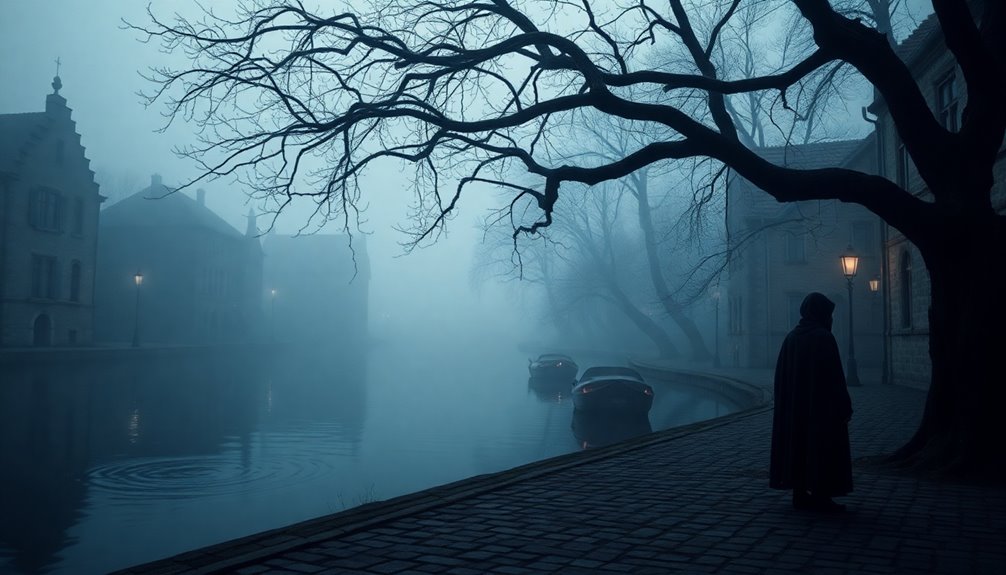
In "Don't Look Now," Venice's dark atmosphere wraps around you like a thick fog, drawing you into its haunting canals.
The water symbolizes the depths of isolation and grief that the characters grapple with, reflecting their inner turmoil.
As you navigate the labyrinth of streets, the oppressive environment becomes a chilling reminder of their emotional despair.
Venice's Dark Atmosphere
Venice's haunting canals create an atmosphere thick with suspense, pulling you into a world where every shadow seems to whisper secrets. The murky waters reflect the couple's grief, mirroring their psychological turmoil as they navigate through a city that feels both enchanting and menacing.
The labyrinthine streets disorient you, heightening the sense of danger lurking in the fog. As you wander, the gothic architecture looms overhead, its rich history adding layers to the chilling narrative.
Du Maurier masterfully uses the setting to amplify themes common in short stories of suspense. Each twist and turn in the city feels like a step deeper into the couple's despair, making you acutely aware of how their emotional states intertwine with the environment.
- The eerie silence of the canals amplifies your unease.
- Foggy nights create a sense of claustrophobia.
- Shadows dance on ancient walls, hinting at hidden truths.
In this dark atmosphere, Venice itself becomes a character, shaping the chilling events that unfold. The city's enigmatic nature echoes the couple's internal struggles, leaving you breathless and intrigued.
Symbolism of Water
The haunting canals of Venice serve as a powerful symbol of the characters' emotional struggles in "Don't Look Now." As you navigate these murky waters, you feel the weight of grief and loss reflected in their depths. Water in this ghost story embodies the fragility of life, constantly reminding you of the inevitable pull of death. The eerie atmosphere, accentuated by the dark, reflective surfaces, disorients you, mirroring the protagonists' psychological turmoil.
Each ripple and shadow in the canals signifies both entrapment and the potential for revelation. You sense a tension between reality and the supernatural as the characters confront their haunting memories. The canals, with their winding paths, act as a conduit for exploring fate and destiny, suggesting that they're submerged in their pasts, unable to escape the grief that binds them.
As you immerse yourself in this setting, the water symbolizes the profound depths of sorrow, capturing the essence of a haunting experience. The canals become a living entity, encasing the characters' emotional struggles in a chilling narrative that resonates with every turn.
Each moment spent by the water deepens your understanding of their lingering pain and unresolved past.
Isolation and Grief
Amidst the labyrinthine canals, isolation grips the grieving couple in "Don't Look Now," amplifying their sorrow with every shadow cast by the murky waters. In Venice, the haunting beauty surrounds you, yet feels suffocating, as the couple's emotional turmoil mirrors the eerie stillness of the canals. The loss of their child looms over them, creating a chasm that deepens with every twist and turn of the waterways.
The canals, with their dark depths, symbolize the obscured boundaries between life and death, reflecting the couple's unresolved grief. You sense the weight of their isolation, intensified by the city's beauty, which starkly contrasts with their internal struggles.
As they navigate this haunting landscape, their sorrow becomes palpable, a silent companion that haunts every moment.
- The canals' eerie ambiance enhances the feeling of entrapment.
- Each shadow evokes memories of loss, amplifying the couple's despair.
- The juxtaposition of beauty and grief creates a chilling atmosphere.
In this chilling narrative, isolation becomes an inescapable reality, deepening the couple's anguish and reminding you of the fragility of life amidst haunting surroundings.
Psychological Depth in Narratives
Diving into the psychological depths of narratives reveals how emotions like love, grief, and jealousy can twist the minds of characters, leading them down dark paths. In Daphne du Maurier's original story collection "Don't Look Now," the psychological complexities take center stage. You witness how deeply rooted emotions can morph into unsettling outcomes, as characters face extraordinary situations that push them to their limits.
Notable tales like "The Birds" and "Don't Look Now" transform mundane settings into psychological battlegrounds, filled with tension and dread. As you read, you sense the characters' internal struggles, especially when grappling with loss and the haunting presence of deceased loved ones. These themes resonate profoundly, reflecting the intricate ways grief can overshadow rational thought, forcing individuals into moral dilemmas.
Du Maurier's mastery of the short story format amplifies this psychological tension, crafting plots that linger long after the last page. The sense of unease she evokes compels you to reflect on the darker corners of the human psyche, revealing how easily love can turn into obsession, grief into madness, and jealousy into a destructive force.
It's a chilling exploration that captivates and unsettles in equal measure.
Reception and Critical Acclaim
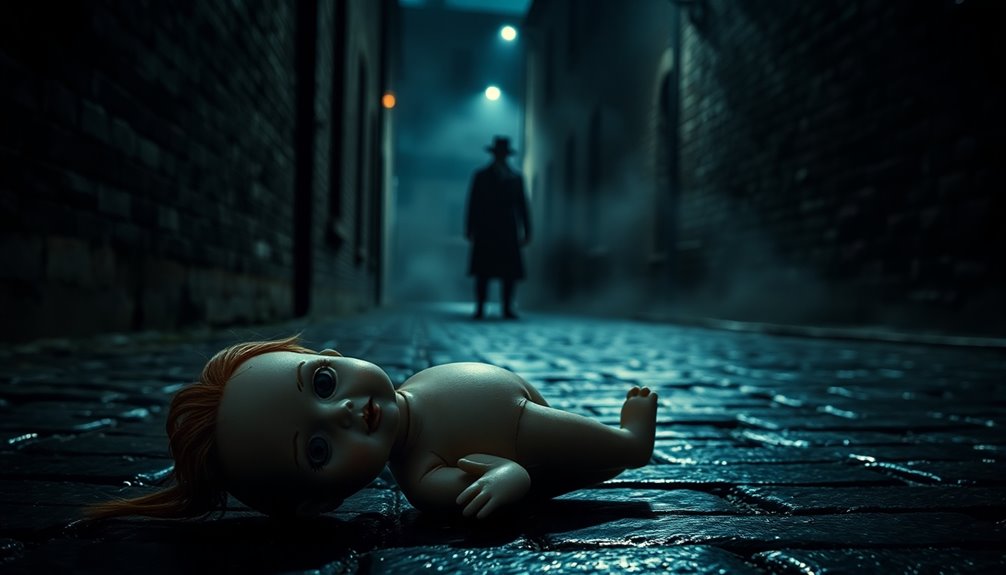
You'll find that "Don't Look Now" has sparked significant reader enthusiasm, earning a solid rating of 3.82 from thousands of reviews.
Critics consistently highlight Daphne du Maurier's skill in crafting suspense, which has led to various literary recognitions.
Its gripping narrative hasn't only influenced adaptations but also continues to resonate with fans of psychological thrillers.
Reader Enthusiasm and Praise
How does Daphne du Maurier manage to evoke such intense reader enthusiasm? "Don't Look Now" stands out with a commendable rating of 3.82 from over 9,000 ratings and nearly 1,000 reviews, showcasing its strong reception.
Readers consistently praise her original mastery of suspense and psychological depth, noting how she crafts a chilling atmosphere that lingers long after the last page.
Du Maurier's ability to transform ordinary situations into gripping narratives resonates deeply with those who explore her work. The collection's dark themes of grief and danger only amplify the emotional impact, making it an unforgettable experience.
- Readers often highlight the intricate plotting that keeps them on edge.
- The emotional resonance of the characters' experiences adds to the story's depth.
- The enduring popularity of du Maurier's works, including adaptations, speaks to her lasting influence.
With "Don't Look Now," you're not just reading a story; you're engaging with a piece of literature that challenges your perceptions and emotions, ensuring its place in the hearts of many.
Literary Awards and Recognition
Daphne du Maurier's "Don't Look Now" has garnered significant literary awards and recognition, cementing her status as a pivotal figure in British literature. The story's masterful blend of suspense and psychological depth has received critical acclaim, earning a rating of 3.82 based on over 9,000 ratings on platforms like Goodreads. Critics often praise "Don't Look Now" for its chilling narrative and intricate plotting, which showcases du Maurier's ability to evoke emotional responses through her writing.
Moreover, du Maurier's work, including "Don't Look Now," is recognized for its significant influence on the horror genre. It's inspired adaptations and comparisons to contemporary authors like Stephen King, further enhancing her legacy. The collection in which "Don't Look Now" appears features some of her most notable stories, solidifying her place in literary circles and academic discussions.
Through its exploration of themes like grief and danger, "Don't Look Now" has captured the attention of both readers and critics alike. This recognition underscores du Maurier's unique talent and the lasting impact her storytelling continues to have on the literary world, ensuring her a prominent spot in the canon of British literature.
Influence on Adaptations
Since its publication, "Don't Look Now" has made a significant impact on adaptations, particularly with the critically acclaimed 1973 film directed by Nicolas Roeg. This adaptation is celebrated for its faithfulness to the original narrative while enriching it with visual depth and emotional resonance.
Featuring powerful performances from Donald Sutherland and Julie Christie, the film captures the essence of du Maurier's chilling atmosphere and psychological tension.
Critics have praised the film for its complex portrayal of the grieving couple, highlighting their emotional struggles and relationships. The adaptation hasn't only garnered a devoted following but also set a benchmark in the horror genre, influencing how psychological horror is depicted on screen.
Here are a few ways "Don't Look Now" has shaped adaptations:
- It's often cited as a classic in film studies.
- The film's chilling atmosphere continues to inspire filmmakers.
- Its emotional depth adds layers to the horror experience.
This enduring influence on adaptations showcases du Maurier's mastery of suspense and the intricacies of human emotion, ensuring that "Don't Look Now" remains relevant in both literary and cinematic discussions.
## Adaptations in Film
Film adaptations of literature often bring a fresh perspective to beloved stories, and Daphne du Maurier's works are no exception. The 1973 film "Don't Look Now," directed by Nicolas Roeg, closely follows the plot of her short story, immersing you in the haunting atmosphere of Venice. Featuring Donald Sutherland and Julie Christie as the grieving couple, the film emphasizes the psychological depth of grief and loss, heightening the suspense that du Maurier expertly crafted in her writing.
Unlike the 1963 adaptation of "The Birds," which veers considerably from du Maurier's original narrative, "Don't Look Now" remains faithful to her themes while exploring the complexities of human emotions. This fidelity has helped solidify du Maurier's status as a master of suspense and intrigue.
Both adaptations have bolstered the popularity of her works, often leading new readers to discover her original stories. The cinematic interpretations spark discussions about how filmmakers translate du Maurier's unique narrative voice into visual storytelling.
Ultimately, these adaptations not only pay homage to her brilliance but also invite you to explore deeper into her rich literary world.
Comparison With Other Stories
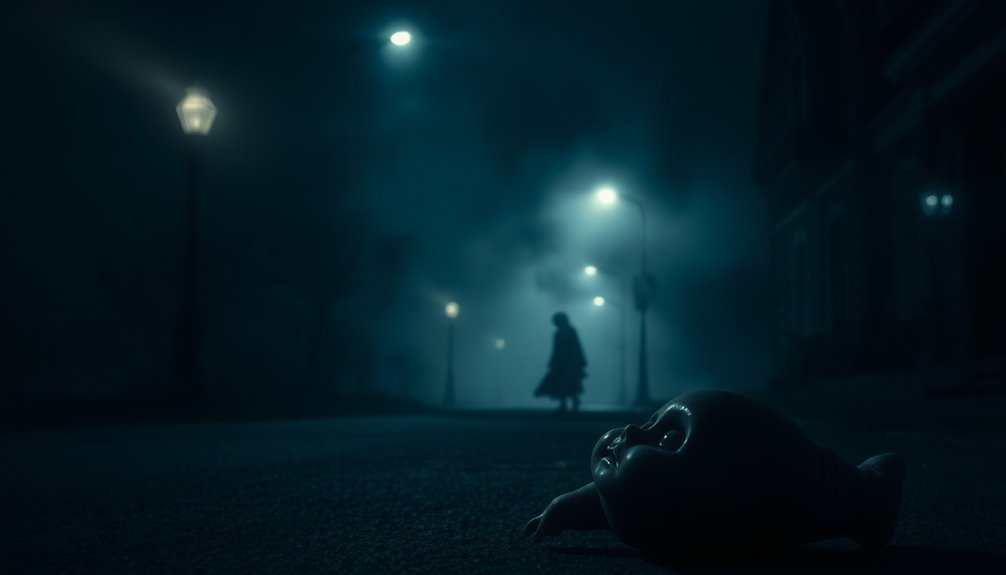
When you plunge into du Maurier's stories, it's fascinating to see how "Don't Look Now" and "The Birds" both create intense suspense, yet explore vastly different themes.
While "Don't Look Now" immerses you in the grief of a couple mourning their twin sisters in Venice, "The Birds" thrusts you into an apocalyptic scenario, showcasing nature's uprising against humanity.
Du Maurier's ability to craft tension and complex characters within her stories is remarkable. You'll notice that "Don't Look Now" carries more emotional depth and intricate plotting, while "The Birds" emphasizes relentless bleakness.
- "Don't Look Now" focuses on human emotions and personal tragedy, enhancing psychological horror.
- "The Birds" offers a more visceral experience, with nature turning against people, creating a sense of dread.
- The adaptations reflect these differences, with "Don't Look Now" staying true to the original narrative, while Hitchcock's take on "The Birds" shifts the focus more toward suspense than its romantic elements.
These contrasting themes highlight du Maurier's versatility as a storyteller, making her work compelling and thought-provoking.
Reader Experience and Reflections
Readers often find themselves enthralled by du Maurier's ability to evoke suspense and tension, especially in "Don't Look Now." Many describe the experience as gripping, with the story pulling you in from the start. Its short format enhances the urgency, making each page feel charged with impending dread.
You might appreciate how du Maurier creates a tight narrative that keeps you on the edge of your seat, even if the intricacies of her writing can sometimes blur the details.
The chilling themes of loss and danger resonate deeply, prompting personal reflections long after you've turned the last page. As you explore the psychological layers, you may find yourself pondering the characters' motivations and fears.
Some readers recommend exploring other works by du Maurier, like "Rebecca," believing her storytelling shines even brighter there.
You might enjoy revisiting "Don't Look Now" as an enthralling bedtime read, though it's common to feel let down by adaptations that stray from the original narrative.
Ultimately, your experience reflects du Maurier's power to create enduring suspense and provoke thought, making her work a lasting part of your reading journey.
Legacy of Daphne Du Maurier
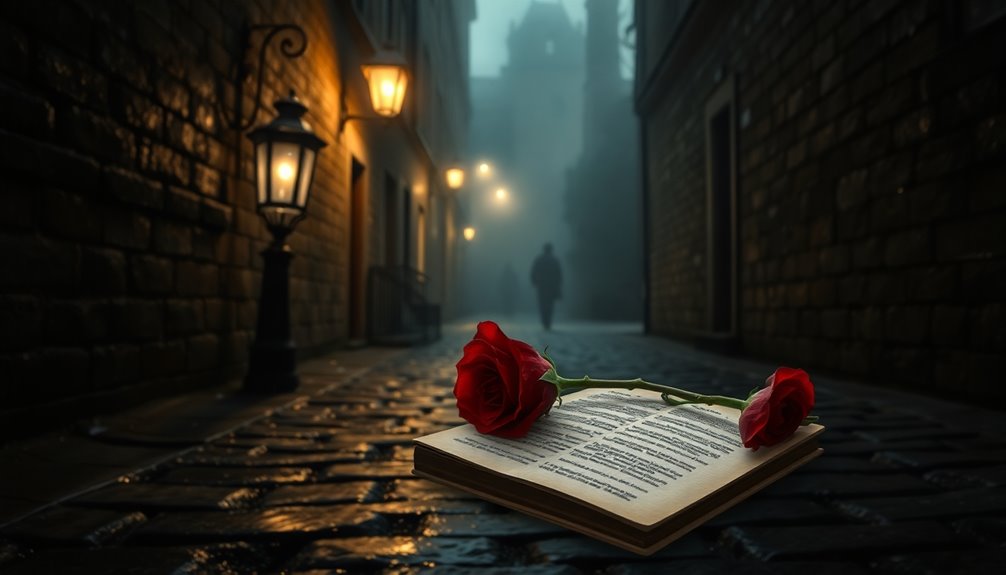
Daphne du Maurier's legacy is undeniably significant, with her works continuing to shape the horror and suspense genres. Her ability to intertwine psychological depth with gripping narratives makes her one of the best-known British authors.
You might recognize her influence through adaptations of her stories, such as "Rebecca" and "The Birds," which have introduced her writing to new audiences. Donald Sutherland starred in the adaptation of "Don't Look Now," further cementing her impact on cinema.
Du Maurier's exploration of universal themes like love, grief, and jealousy resonates deeply. Her characters reveal the complexities of human emotions, drawing readers into their haunting worlds.
Consider these aspects of her legacy:
- Psychological Depth: Her stories investigate the intricacies of the human psyche.
- Film Adaptations: Many of her works have been transformed into iconic films, reaching a broader audience.
- Enduring Relevance: Her unique storytelling style guarantees her works remain significant and widely read today.
In examining her legacy, you'll find that du Maurier's influence endures, shaping the landscape of modern suspense and horror literature.
Community Engagement Opportunities
Engaging with your community can enhance your reading experience in exciting ways. By participating in community engagement initiatives, you can help shape the future of literary selections, including the chance to suggest books for reprinting. Your voice matters, and your feedback can lead to potential additions to popular series, fostering a collaborative environment where readers influence what gets published.
Joining the NYRB Classics Book Club is another fantastic opportunity. Here, you'll enjoy a year filled with engaging reading experiences and gain access to curated selections that reflect diverse themes and interests. This membership not only enriches your reading life but also connects you with fellow book lovers.
If you're looking for versatile gifting options, consider purchasing gift cards. These allow friends and family to choose their own books, guaranteeing they'll find something that resonates with their tastes.
Community engagement doesn't just enhance your literary journey; it guarantees a broader array of stories that genuinely reflect the interests and preferences of readers like you.
Purchasing Options for Readers
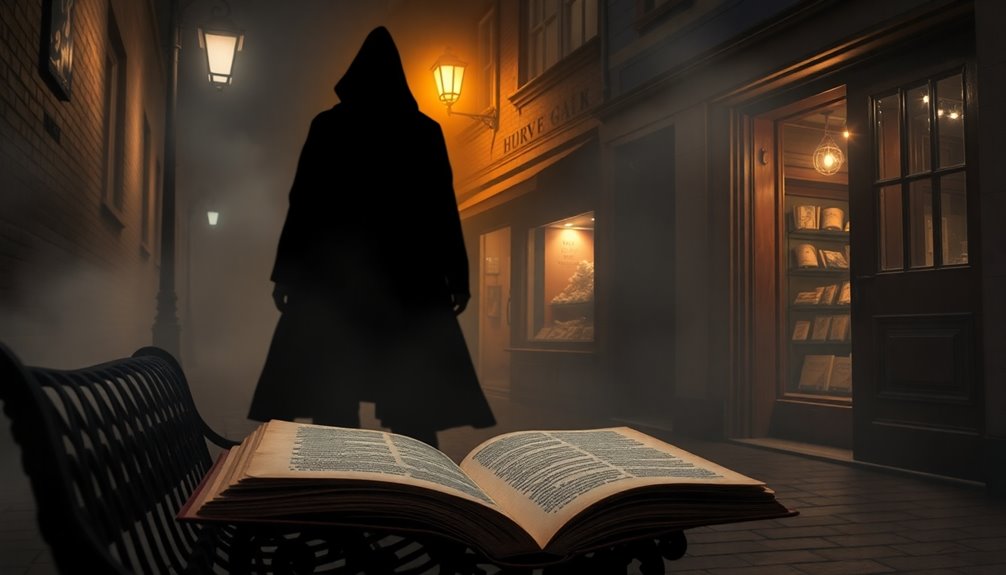
When exploring your literary options, the variety of purchasing avenues available can markedly enhance your reading experience. For fans of "Don't Look Now," whether you're drawn in by its suspense or the cinematic portrayal by Donald Sutherland, you'll find several convenient purchasing options for readers.
- The paperback edition is available for just $17.95, allowing you to immerse yourself in this chilling tale without breaking the bank.
- You can easily adjust the quantity you want to buy, making it simple to gift copies or stock your personal library.
- Gift cards are also offered, giving your friends and family the freedom to choose their own books.
Additionally, consider joining the NYRB Classics Book Club. A membership promises a year of curated reading experiences, enriching your literary journey.
You're not just a reader; you can engage with the community by suggesting books for reprinting and offering feedback on potential additions to the series. This way, you can actively participate in shaping the literary landscape.
With these options, you're well-equipped to enjoy "Don't Look Now" and discover even more enthralling reads.
Conclusion
In the end, Daphne Du Maurier leaves you with a lingering chill, like a shadow that dances just out of sight. Her ability to weave suspense keeps your heart racing and your mind questioning the unseen. As you close the book, you can't shake the feeling that the world around you is more complex than it seems. This haunting tale invites you to explore your own fears and uncertainties, reminding you that sometimes, the unknown is where the true story lies.

